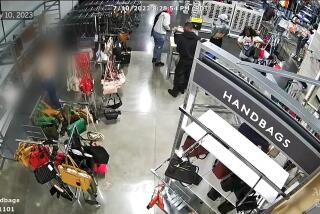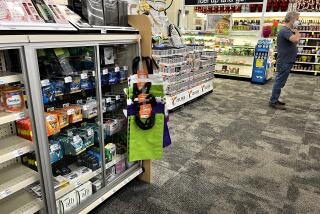Shoplifting of Rental Movies Takes Toll in First Quarter : Wherehouse Earnings Drop 28%
- Share via
Wherehouse Entertainment, which has been battling a shoplifting problem at its record and videocassette stores, reported Monday that earnings for the first quarter fell 28% despite a 34% rise in revenue.
For the period ended Sept. 30, Wherehouse posted a $754,000 profit, down from $1.05 million in the year-ago quarter. Revenue increased to $39.1 million from $29.2 million.
The results were basically in line with the revised forecasts of analysts, who reduced their first-quarter projections after the company announced in September that it would substantially increase reserves to cover “inventory shrinkage.”
The Gardena-based company has acknowledged that the problem affects primarily rental videocassettes, but it has not revealed the extent of the loss, either in dollars or units. To combat the problem, Wherehouse is installing electronic surveillance equipment in the 86 of its 144 stores that display rental videotapes on the sales floor.
Richard H. Chapin, chief financial officer, said Monday that the company is not planning in the near future to disclose the amount by which it is increasing its reserves. Analysts estimate that the company has lost between $1 million and $2 million in inventory to shoplifters.
3 Class-Action Suits
In releasing the first-quarter report, Louis A. Kwiker, president and chief executive, said: “Revenues continued strong through the quarter. Video rental and prerecorded music revenues both registered substantial increases.”
In another development related to the shoplifting problem, three investors have filed class-action lawsuits in Los Angeles Superior Court against Wherehouse and its top officers, accusing them of releasing public documents that misled investors by playing down the extent of the thefts.
Two of the suits are expected to be dismissed, according to attorneys for Wherehouse and the shareholders. However, the third case, filed last month on behalf of Florida investor William B. Weinberger, is expected to proceed, according to William S. Lerach, an attorney for Weinberger.
The Weinberger suit contends that the company’s “revenues and earnings in its interim financial statements were materially overstated.”
The company said the shrinkage problem did not come to light until after a two-month inventory count that was started at the end of its fiscal year June 30.
In an interview last month, Wherehouse’s Kwiker said the problem grew out of the company’s decision to put rental cassettes on the sales floor rather than behind the counter. The change, which was intended to cut labor costs and shorten transaction times, also made it easier for shoplifters.
The suit also challenges statements made by the company in a prospectus for a March 7 stock offering, and it said that the company’s public statement in September about the inventory shrinkage “made it appear that the shrinkage was minimal, temporary, had been remedied and was fully controlled by the company.”
Chapin would not comment Monday on the lawsuit.
Despite the shoplifting problem, analysts continue to be upbeat about Wherehouse.
“The key thing is that the (first-quarter) revenues are very strong,” said William A. Block, an analyst with Hoguet, Muzinich, Keller & Co. in New York. “I think that what you’re going to see for the remainder of the year is revenue gains close to 50%.”
He noted that, during fiscal 1986, the company plans to open 48 new stores, close nine stores and relocate 10 others. The changes will result in a 50% increase in selling space to 940,000 square feet.
Ron Rotter, an analyst with Seidler Amdec Securities in Los Angeles, said the company appears gradually to be raising prices on some of its rental tapes, a change that will improve the revenue and earnings picture. Many tapes listed in the Wherehouse catalogue that in the past would have rented for $1 now are offered at $2.50, he said.
Analysts played down the importance of the lawsuits. Lee Isgur of Paine Webber in New York said: “To me, they’re just an annoyance.” He said he expects the company to rebound strongly.
More to Read
The biggest entertainment stories
Get our big stories about Hollywood, film, television, music, arts, culture and more right in your inbox as soon as they publish.
You may occasionally receive promotional content from the Los Angeles Times.











